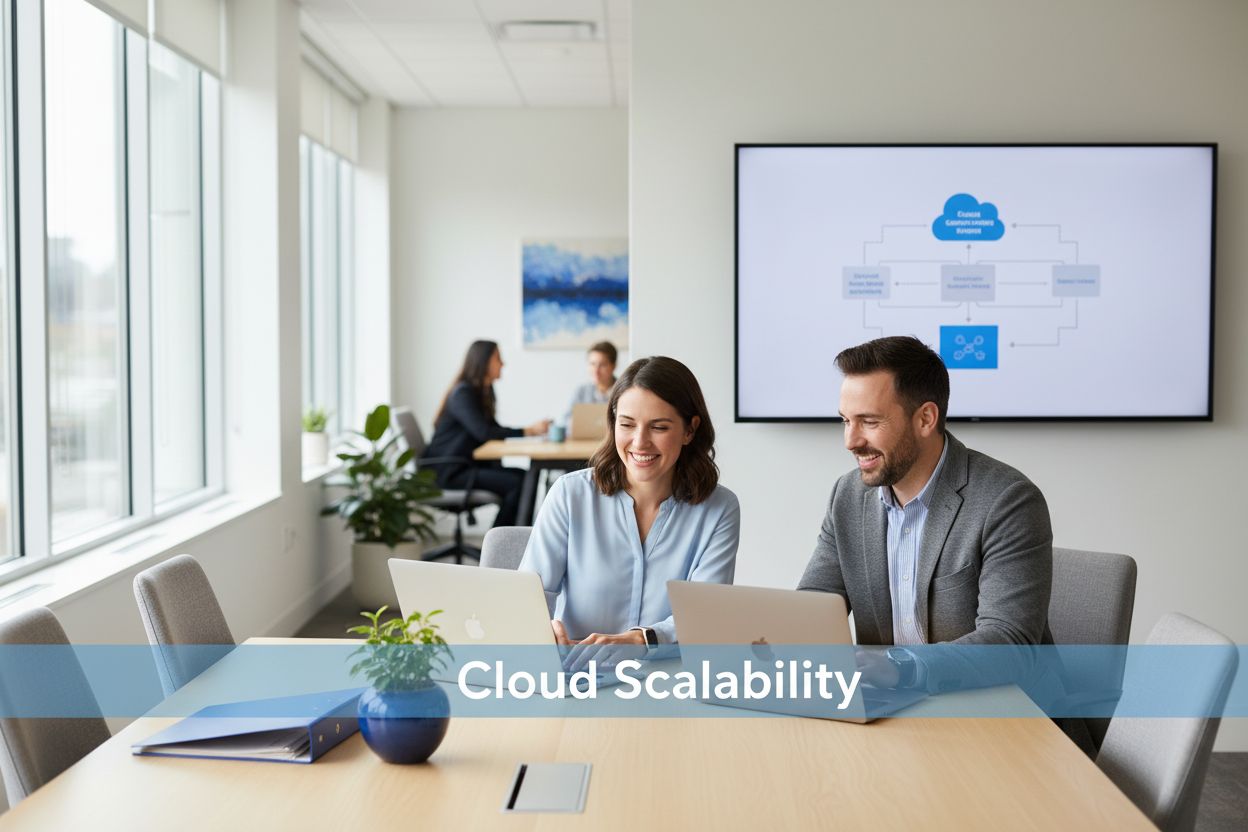Understanding Why Cloud Scalability Matters for CPA Firms

Cloud scalability has become a buzzword for ambitious CPA firms and for good reason. Deloitte reports that firms using scalable cloud solutions can cut infrastructure costs by up to 30 percent. Surprising, right? Most firms expect new tech to mean bigger expenses and complicated setups but cloud scalability actually makes your IT budget more flexible and your operations smoother. The smartest firms in Miami tap into this dynamic power to leap ahead of the competition.
Table of Contents
- What Is Cloud Scalability And Its Importance?
- Why Does Cloud Scalability Matter For Accounting Practices?
- How Cloud Scalability Works In Real-World Applications
- Key Concepts Of Cloud Scalability For Cpas
Quick Summary
| Takeaway | Explanation |
|---|---|
| Cloud scalability enhances operational flexibility. | It allows accounting firms to adjust computing resources dynamically based on workload, especially during peak times like tax season. |
| Cost savings with scalable cloud solutions. | Implementing cloud scalability can reduce infrastructure costs by up to 30%, allowing firms to access advanced technology without significant upfront investment. |
| Improved client service during high-demand periods. | Scalable cloud systems ensure seamless handling of multiple transactions without slowdowns, enhancing client satisfaction and operational efficiency. |
| Robust security through scalable solutions. | Cloud platforms often provide stronger security measures than traditional systems, essential for protecting sensitive financial data in accounting practices. |
| Pay-as-you-go model for technology expenses. | Scalable cloud solutions transform IT from capital expenditures to operational expenses, making it financially accessible for firms of any size. |
What is Cloud Scalability and Its Importance?
Cloud scalability represents a game changing solution for accounting firms navigating the complex world of digital transformation. At its core, cloud scalability means your technology infrastructure can dynamically grow or shrink based on your firm’s precise needs. Think of it like an accordion that expands and contracts effortlessly without losing its fundamental structure.
Understanding the Fundamentals
For a CPA firm, cloud scalability translates to incredible operational flexibility. According to the National Institute of Standards and Technology, scalability allows organizations to automatically adjust computing resources in real time. This means during tax season when your workload triples, your systems can instantly scale up processing power without you purchasing additional hardware or experiencing performance lags.
Why CPAs Need Scalable Cloud Solutions
Accounting professionals face unique technological challenges that demand responsive infrastructure. Cloud scalability addresses these challenges by providing:
- Instant resource allocation during peak periods
- Cost effective computing that matches actual usage
- Reduced infrastructure maintenance expenses
- Enhanced data security and compliance capabilities
The magic happens behind the scenes. When your firm needs more computational power for complex tax calculations or large client audits, cloud scalable systems automatically provision additional resources. Conversely, during slower periods, these systems contract, ensuring you only pay for what you actually use.
For Miami accounting firms juggling everything from individual tax returns to complex corporate audits, cloud scalability offers a strategic advantage that traditional IT infrastructure simply cannot match. Your technology becomes a responsive partner that grows alongside your business ambitions.
Pro Tip: When evaluating cloud solutions, always confirm the system’s actual scalability metrics. Not all cloud services are created equal. Look for platforms promising rapid, seamless resource allocation with minimal technical intervention. Read more about digital scaling strategies to fully leverage these technological capabilities.
Why does Cloud Scalability Matter for Accounting Practices?
Accounting practices operate in an increasingly complex digital ecosystem where technology determines competitive advantage. Cloud scalability isn’t just a technical upgrade it represents a strategic transformation that directly impacts how firms manage resources, serve clients, and maintain operational efficiency.
Financial Performance and Resource Management
Traditional IT infrastructure forces accounting firms into expensive, rigid technology investments. Cloud scalability flips this model by allowing dynamic resource allocation. According to Deloitte’s technology research, firms can reduce infrastructure costs by up to 30% by implementing scalable cloud solutions. This means smaller practices can access enterprise grade technology without massive upfront capital expenditures.
Client Service and Operational Flexibility
Cloud scalability directly enhances client service capabilities. During peak seasons like tax filing periods, your technological infrastructure can instantly expand to handle increased workloads. Key advantages include:
- Seamless handling of multiple simultaneous client transactions
- Reduced system slowdowns during high demand periods
- Consistent performance across computational requirements
- Immediate adaptation to changing business needs
Miami accounting firms specifically benefit from cloud scalability because of the region’s dynamic business landscape. Whether you are managing complex international tax scenarios or handling rapid startup financials, scalable cloud systems provide the technological agility needed to stay competitive.
Security and Compliance Considerations
Cloud scalability isn’t just about technological flexibility it’s also a critical component of modern cybersecurity strategies. Research from Gartner indicates that cloud platforms offer more robust security protocols than traditional on premise systems. For accounting practices dealing with sensitive financial data, this means enhanced protection against potential breaches.
Pro Tip: When evaluating cloud scalability solutions, always prioritize platforms that offer comprehensive security certifications and demonstrate proven compliance with industry regulations. Check out our guide on digital innovation best practices to understand how technology can transform your accounting practice.
How Cloud Scalability Works in Real-World Applications
Cloud scalability transforms how accounting practices manage technological resources, shifting from traditional rigid infrastructure to dynamic, responsive systems. Understanding its real-world application means recognizing how technology can seamlessly adapt to your firm’s changing operational demands.
To clarify the differences between the two main approaches to cloud scalability described for CPA firms, the following table compares vertical and horizontal scaling in terms of definition, method, and their relevance to accounting practices.
| Approach | Definition | Method | Relevance for CPA Firms |
|---|---|---|---|
| Vertical Scaling | Increasing resources within a single system | Add RAM, CPUs, or storage to one server | Suitable for boosting performance during seasonal peaks |
| Horizontal Scaling | Expanding capacity by adding more machines or nodes | Add more servers to distribute workload | Ideal for large firms needing consistent global performance |
Vertical vs Horizontal Scaling
Accounting firms encounter two primary cloud scalability approaches.
 Vertical scaling involves adding more power to an existing system by increasing computational resources like RAM or processing speed. Horizontal scaling means adding more machines or nodes to distribute workload across multiple systems. According to federal agency technology research, organizations can reduce infrastructure costs by implementing intelligent scaling strategies that match precise computational requirements.
Vertical scaling involves adding more power to an existing system by increasing computational resources like RAM or processing speed. Horizontal scaling means adding more machines or nodes to distribute workload across multiple systems. According to federal agency technology research, organizations can reduce infrastructure costs by implementing intelligent scaling strategies that match precise computational requirements.
Practical Implementation Scenarios
Real world cloud scalability looks different for various accounting practice sizes. For small firms, this might mean:
- Automatic resource allocation during tax season
- Seamless data storage expansion
- Instant access to advanced computational tools
- Pay as you go infrastructure models
Larger practices can leverage more complex scalability models, dynamically provisioning resources across multiple geographic locations, ensuring consistent performance and minimal service interruptions. Miami accounting firms dealing with international clients particularly benefit from these flexible technological frameworks.
Performance and Cost Optimization
Cloud scalability isn’t just about expanding resources it is about intelligent resource management. Advanced cloud platforms use predictive algorithms to anticipate computational needs, automatically adjusting infrastructure before performance bottlenecks occur. This proactive approach ensures accounting practices maintain optimal technological performance without manual intervention.
Pro Tip: When implementing cloud scalability, always conduct thorough performance testing and choose platforms offering transparent, granular resource allocation metrics. Learn more about startup scaling strategies to understand advanced technological deployment techniques.
Key Concepts of Cloud Scalability for CPAs
Cloud scalability represents more than just technological jargon for accounting professionals. It is a strategic approach to managing computational resources that directly impacts operational efficiency, client service quality, and financial performance.
Core Components of Scalable Infrastructure
At its essence, cloud scalability involves three fundamental architectural concepts that CPAs must understand. Elasticity allows systems to automatically expand or contract based on real time computational demands. Load balancing distributes workloads across multiple computing resources to prevent system overload. Resource provisioning enables instant allocation of computational power precisely when and where it is needed.
According to federal technology standards, these components work together to create a responsive technological ecosystem that adapts to an accounting practice’s changing requirements. For Miami accounting firms handling complex financial portfolios, this means maintaining peak performance during high stress periods like tax season.
To provide a concise overview of the key components that enable cloud scalability for accounting practices, the following table defines each core element and its specific function within a scalable infrastructure.
| Component | Definition | Function in Cloud Scalability |
|---|---|---|
| Elasticity | Ability of a system to expand or contract in real time based on demand | Automatically adjusts resources to meet workload changes |
| Load Balancing | Distribution of workloads across multiple computing resources | Prevents overload by spreading tasks evenly |
| Resource Provisioning | Allocation of computing resources as needed | Provides instant power where and when it’s required |
Risk Management and Compliance Considerations
Cloud scalability isn’t just about technological flexibility it is a critical risk management strategy. Accounting practices deal with sensitive financial data that requires robust security protocols. Key compliance advantages include:
- Automated security patch implementations
- Instant disaster recovery capabilities
- Centralized data governance
- Comprehensive audit trail maintenance
- Regulatory standard adherence
Miami CPA firms operating in a dynamic business environment need technological infrastructure that can rapidly adjust while maintaining ironclad data protection standards. Scalable cloud systems provide this critical balance between operational agility and regulatory compliance.
Economic Implications for Accounting Practices
Understanding cloud scalability means recognizing its profound economic impact. Traditional IT infrastructure required massive upfront investments and long term commitments. Modern scalable cloud solutions offer a pay as you consume model, transforming technology from a capital expense to an operational expense. This shift allows accounting practices of all sizes to access enterprise grade technological capabilities without prohibitive financial barriers.

Pro Tip: When evaluating cloud scalability solutions, prioritize platforms offering transparent pricing models and comprehensive compliance certifications. Check out our digital transformation guide for CPAs to understand how technology can strategically elevate your accounting practice.
Ready to Eliminate the Stress of Unpredictable IT and Compliance Gaps?
Your CPA firm cannot afford slow systems or uncertain security during tax season. As highlighted in this article, the biggest challenge for Miami accounting practices is keeping up with changing workloads and tightening compliance standards while maintaining reliable technology. Cloud scalability changes the game for accounting professionals who are tired of dealing with downtime, lost productivity, and rigid infrastructure. At Transform42, we specialize in aligning advanced cloud solutions with your firm’s goals so you never worry about system overload or regulatory risk. You gain operational flexibility, seamless performance when you need it, and greater peace of mind about client confidentiality.

Imagine having 99.99% uptime, guaranteed 15-minute responses, and no surprise costs—even when your needs spike overnight. That is the power of our managed IT for accounting firms. If you are ready to move past IT problems and premature hardware upgrades, visit Transform42 now and discover how our tailored solutions deliver the scalable, secure cloud environment your practice demands. Start your transformation today because your clients expect your best every single day.
Frequently Asked Questions
What is cloud scalability for CPA firms?
Cloud scalability refers to the ability of a CPA firm’s technology infrastructure to dynamically grow or shrink based on the firm’s needs, allowing for efficient resource management and cost-effective solutions.
Why is cloud scalability important for accounting practices?
Cloud scalability is crucial for accounting practices as it enables instant resource allocation during peak periods, reduces infrastructure maintenance expenses, enhances data security, and supports compliance requirements.
How does cloud scalability enhance client service for CPA firms?
Cloud scalability enhances client service by ensuring seamless handling of increased workloads during busy seasons, maintaining consistent performance, and quickly adapting to changing business demands without slowdowns.
What are the core components of scalable cloud infrastructure?
The core components of scalable cloud infrastructure include elasticity, which allows systems to expand or contract based on demand; load balancing, which distributes workloads across resources; and resource provisioning, enabling instant allocation of computational power as needed.

